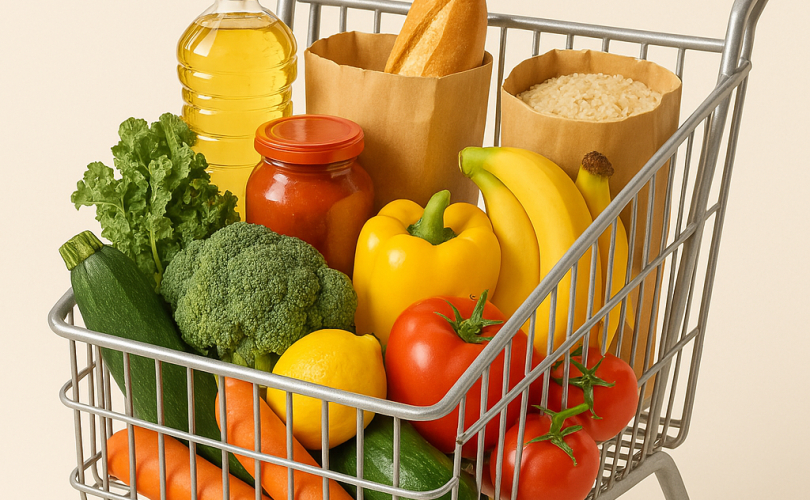How to Save Money on Groceries Without Feeling Deprived: Smart Budgeting Tips for Beginners
Grocery shopping is a necessity, but it doesn’t have to be a financial burden. Many people struggle to balance their budget while still enjoying the foods they love. The good news? You don’t have to sacrifice quality or variety to cut costs. With a few smart strategies, you can reduce your grocery bill while still enjoying satisfying and nutritious meals.
Plan Your Meals with a Purpose
One of the most effective ways to save money is to plan your meals ahead of time. Walking into a store without a plan can lead to impulse purchases and overspending. Instead, take a few minutes each week to decide what you’ll eat for breakfast, lunch, and dinner. Focus on ingredients that can be used in multiple dishes to minimize waste. For example, if you buy a whole chicken, you can roast it for dinner one night, use leftovers for sandwiches the next day, and make soup with the bones.
Using a shopping list based on your meal plan can also keep you on track. Studies show that shoppers who use a list spend significantly less than those who don’t. Plus, knowing exactly what you need helps you avoid unnecessary trips to the store, which can lead to additional spending.
Take Advantage of Sales and Discounts
Supermarkets frequently rotate discounts on different products, so learning how to shop smart can make a big difference. Many stores have weekly ads or digital coupons that offer great savings. Before heading out, check your local store’s website or app to see what’s on sale. Buying non-perishable items like rice, pasta, and canned goods in bulk when they’re discounted can also cut costs over time.
Another way to save is by signing up for store loyalty programs. These programs often provide exclusive discounts, cashback rewards, and personalized coupons based on your shopping habits. It might not seem like much at first, but small savings add up over time.
Shop Seasonal and Local
Fresh produce can be expensive, but buying in-season fruits and vegetables can help keep costs down. When produce is in season, it’s more abundant, which means lower prices. For example, strawberries are usually cheaper in the summer, while root vegetables like carrots and potatoes are more affordable in the fall and winter.
Farmers’ markets and local produce stands are also great places to find fresh, affordable food. Not only can you save money, but you’re also supporting local farmers and getting better quality produce compared to some grocery store options.
Cut Back on Convenience Foods
Pre-packaged and processed foods might be convenient, but they often come with a higher price tag. Instead of buying pre-cut fruits and vegetables, take a few extra minutes to chop them yourself. Rather than purchasing individually packaged snacks, buy larger bags and portion them out at home. The same goes for coffee—making your own at home instead of buying it daily from a café can save you hundreds of dollars a year.
Cooking from scratch is another excellent way to save money. Homemade meals tend to be healthier and more cost-effective than takeout or frozen dinners. For instance, making a homemade pizza can cost a fraction of what you’d pay for delivery, and you can customize it with ingredients you already have.
Avoid Wasting Food
Food waste is like throwing money in the trash. According to the USDA, the average American family wastes about 30-40% of the food they buy. One way to combat this is by properly storing perishables to extend their shelf life. For example, keeping herbs fresh by storing them in a jar of water or wrapping lettuce in a paper towel can prevent premature spoilage.
Another useful habit is to organize your fridge and pantry so that older items are in the front, making them easier to use before they expire. Get creative with leftovers—turn roasted vegetables into a soup, blend overripe bananas into smoothies, or use stale bread to make croutons. The less you waste, the more you save.
Make Grocery Shopping an Intentional Habit
Grocery shopping shouldn’t be an impulsive activity. Shopping when you’re hungry can lead to unnecessary purchases, so eat before heading to the store. Likewise, shopping alone can help you stick to your budget better than going with children or family members who might convince you to buy extras.
If you’re looking to streamline your spending even further, consider using grocery delivery or pickup services. This eliminates the temptation to grab extra items while walking through aisles, and you can compare prices more easily before checkout. Many services even offer discounts on your first few orders, which can add to your savings.
Small Changes, Big Savings
Saving money on groceries doesn’t mean you have to feel deprived. By planning meals, shopping smart, cooking at home, and reducing waste, you can keep more money in your pocket while still enjoying delicious and nutritious meals. The key is to make gradual changes that fit your lifestyle—before you know it, these small habits will become second nature, and your grocery bill will be noticeably lower.
To know more about financial advice – click here.





